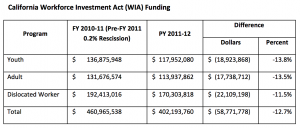Just a few years ago, California was flush with job training
money. The federal Stimulus of 2009, the American Recovery and Reinvestment Act
(ARRA), brought to California an additional $488 million in Workforce
Investment Act (WIA) funds-adult activity funds, dislocated worker funds and
youth funds. This $488 million was in addition to the $496 million in regular
program year 2009 WIA funding.
The ARRA funding has been near entirely spent and for the
2011-2012 year, the workforce community in California is facing a scaled back,
though still significant, WIA expenditure.
Mr. Michael Evashenk of the Employment Development Department’s
workforce division knows as much about WIA funding as anyone in our state. He
prepared the following chart showing the WIA funding for the upcoming year.
California drops from $460 million to $402 million, a
decrease of 12.7%. This is a larger decrease than the national decrease
of 9.8%– $3.198 billion in WIA funds in 2010/2011, $2.88 billion in 2011/2012.
(The high water mark for WIA funds in California was in 2000 when WIA funding reached
around $600 million.)

Yet, while our WIA funds are flat or declining,
other funding sources are emerging on the federal level. High among these is an
unlikely source, the training grants associated with the controversial H-1B
visas. The H-1B visa is the non-immigrant visa, which allows employers to
temporarily employ foreign workers. It has been under attack for years-with the
claim that employers, including major technology employers in California, hire
foreign workers at reduced wages and/or reduced training costs.
As part of the program, employers pay into a
training fund. For 2011-2012, the U.S. Department of Labor in the spring
announced $241 million in H-1B Technical Skills Training grants. These grants are
targeted at the occupations and industries for which employers are using H-1B
visas. Technology is singled out as a sector, as is health care. For training
approach, On-the-job training is favored-reflecting the training pendulum
swinging to this hire and train approach.
We hear from time to time in the California press
about skills shortage in technology, health care, and precision manufacturing,
in the midst of today’s job scarcity. These shortages usually are exaggerated:
when researched they usually turn out to be shortages of a relatively small
number of workers, certainly not thousands or even hundreds in an area. Still, there
are niche training gaps, and the H-1B training funds provide a valuable funding
addition at this time of cutbacks. California training groups can expect to
receive at least $30 million in training funds.
Meanwhile, beyond the public workforce system,
California’s entrepreneurs continue to experiment with new approaches to
training and placement, and to workforce funding. A noteworthy current effort
is the Encore Career Institute being developed by two of California’s leading
technology and entertainment entrepreneurs, Steve Poizner and Sherry Lansing,
and backed by $15 million in venture
capital funds (InterWest Partners and Granite Ventures of Silicon Valley).

Encore Career Institute is aimed at the retraining market, a
large and definitely growing market in California of workers seeking to
transition to new careers. At Fox and
Hounds, we have discussed this retraining market in previous posts (here,
here,
and here),
and the response of the community colleges, California State Universities, and
private proprietary schools to develop retraining programs.
Encore is offering an on-line training approach, with
courses and curriculum developed by UCLA Extension. Participants will receive
certifications in targeted specialties in fields such health care and finance.
The training will be highly concentrated, one year or less.
 Even on-line job training has become a crowded field, so
Even on-line job training has become a crowded field, so
that any new entrant must distinguish itself. The experience of on-line
training in the past years shows that with the labor market so crowded in
California, any training, however well-designed, must be linked to an effective
system of job placement assistance. Given the track record of Poizner
(SnapTrack, the GPS cell phone company he founded sold to Qualcomm for $1
billion) and Lansing (former CEO of Paramount Pictures and successful
independent producer), Encore is a private sector training approach worth
following.

